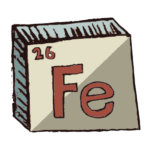
Understanding the role of iron in horses
Iron is an important mineral for horses, but its use is often misunderstood. While humans may often be deficient in this element, horses rarely suffer iron deficiency. Iron is an incredibly abundant trace mineral and horses are very efficient at conserving and utilizing it.
Energy supplements, complete feeds, and blood building supplements often include supplemental iron, so it’s important to be careful; iron overload is not uncommon and can lead to serious health consequences.
Do our horses need more iron?
 Iron is the fourth most abundant element in the earth. Horses get iron through forage, hay, fortified feeds, whole food, multivitamin and mineral supplements, and herbal supplements.
Iron is the fourth most abundant element in the earth. Horses get iron through forage, hay, fortified feeds, whole food, multivitamin and mineral supplements, and herbal supplements.
Typically, blood building supplements and many multivitamin and mineral formulas provide iron as an ingredient, based on the idea of combating iron deficiency. While anemia is possible for horses with parasite overloads or gastric ulceration leading to blood loss, actual iron deficiency is very rare in horses. In fact, the biology of horses makes them very effective conservators of iron.1
A 2022 study published in Animals showed that from 5837 hay samples submitted for analysis at Equi-Analytical in 2017, the average iron concentration was more than five times that required by the athletic horse. Twelve percent of those samples contained iron at or above the maximal tolerable amount set by the 2005 NRC.2
How horses control iron uptake
A horse’s iron uptake starts in the digestive tract. Once the iron is absorbed from the small intestine into the bloodstream, it is transported by transferrin, a host protein, to the liver and spleen for production of hemoglobin and a form of iron called ferritin. Stored in the liver and spleen, ferritin is a safe form of iron that’s available to the horse when needed.
The role of the gut microbiota
Through a process called “dynamic modulation”, microorganisms in the gut contribute to the bioavailability of minerals such as iron. Iron has a direct impact on host microbiota interactions: altering microbial growth, affecting the host immune system and a range of other biochemical processes. Too much of a trace mineral like iron can influence this modulation of the microenvironment of the GI tract, negatively affecting nutrient availability.3
Some research has indicated that pathogenic bacteria growth is linked with higher iron levels. Pathogenic bacteria possess more efficient pathways to acquire free iron and have more than one mechanism for exploiting iron sources.4

Iron is abundant in nature, through forage, hay, fortified feeds, whole foods, and supplements.
Too much? Or not enough?
Because BioStar uses ingredients that are plants and foods, our raw materials are assayed for nutrient content. I have yet to see a single plant or food we use that is deficient in iron. It is, again, one of the most prevalent elements in the earth. More times than not, when I look at a food assay, I’m thinking wow that’s a lot of iron.
Iron toxicity in horses
For horses, iron toxicosis is a bigger problem than iron deficiency, because horses cannot excrete excess iron.
Excess iron over a prolonged period can accumulate in the liver. A study by Dutch researchers, published in the Equine Veterinary Journal (2018) found hemochromatosis (build-up of excess iron in the body) and liver dysfunction in 21 horses and one donkey from the high iron content of water used on the farms. Nine of the 21 horses were eventually euthanized. Five years later the iron levels were still elevated in the 13 surviving equines. 5
Iron overload and insulin resistance
Iron overload with IR is a hot topic among researchers. On one hand, some researchers conclude that horses are such good regulators of iron that overload is rare.6
On the other hand, another study identified excess serum ferritin in all 33 of the confirmed IR horses in the study.7
Red blood cell production
Dietary supplementation of iron does not boost red blood cell production. In horses, iron is required for synthesis of hemoglobin which picks up oxygen and transports it to body tissues. The body uses iron primarily for oxygen transportation.
In conclusion
Horses are rarely deficient in iron. While iron is an important trace mineral for horses, too much of it can disrupt the microbial balance in the gut, leading to potential proliferation of pathogenic bacteria. Excess iron also accumulates over time in the liver and can cause long-term health issues.
Suggestions
Test your hay and forage, and your water if you have a well. If you are in a boarding situation where frequent loads of hay arrive and aren’t tested, be careful about feeding supplements with added iron.
References
1 – https://ker.com/equinews/anemia-horses-supplemental-iron-not-cure/
2 – https://pubmed.ncbi.nlm.nih.gov/36230253/
3 – https://www.ncbi.nlm.nih.gov/pmc/articles/PMC6315993/
4 – https://www.frontiersin.org/articles/10.3389/fcimb.2013.00080/full
5 – https://pubmed.ncbi.nlm.nih.gov/30269378/
6 – https://pubmed.ncbi.nlm.nih.gov/36230253/
7 – https://www.ncbi.nlm.nih.gov/pmc/articles/PMC6971364/








